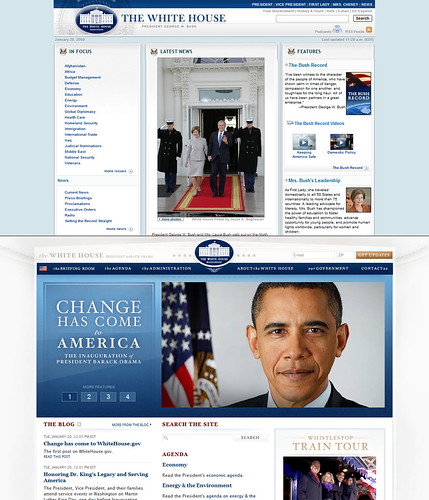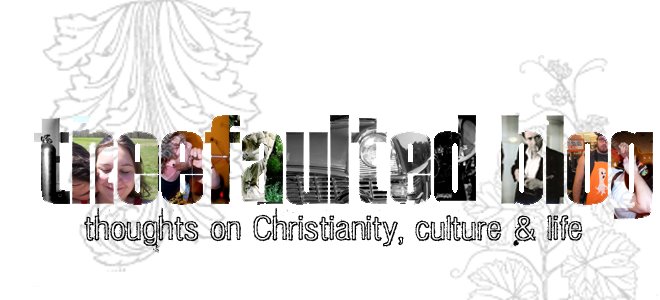Monday, January 26, 2009
Can Communion be observed outside the local church setting?
As part of that unique position, I've been looking into how to have meaningful worship services for the 100 plus staff for the summer. Most of the staff will be here 4 months with no chance to go to church. So for many the weekly worship service will be the only worship service they attend all summer. So I'm pondering how to I create authentic and Biblical worship services for this group of young Christians in this unique situation? I've talked with the camp director about some of the ways they've previously addressed this problem, and am stuck. Should a temporary community of Believer's, worship in the same way as an established church? In particular, can the share in communion?
I've read arguments on both sides, and have been convinced by neither. I've heard that Acts 27:35 is Paul having communion outside the confines of the local church. I've also heard arguments from those who think only a priest can offer the Eucharist.
Obviously if we were to have communion it would be in the Open Communion ideology. Anyone with an opinion based in scripture is welcome to respond.
Wednesday, January 21, 2009
President Obama and the use of Media

Only time will tell if this trend will continue. Will Obama continue his internet presence, or will the time requirements of the Oval Office slowly strangle them out? Lets hope it will continue, and change will really take place. Now if we could get churches to follow his lead, and get into the 21st century. Wake up and pay attention pastors; younger congregants want transparency and new ways to connect with their leaders.
John Cade has more on this subject at threeparts.com
Thursday, January 8, 2009
Surburban Church?
America is a nation transformed by demographics. Flash back just over a century and a majority of Americans live on farms and in rural settings. Today, a clear majority of Americans live in metropolitan settings. Cities are now surrounded by vast rings of settlements and clusters known as suburbs -- and Hollywood doesn't like it.My question is what do you think about how churches and cities have changed. I think most of what Mohler said is a clear analysis of how many churches have responded to the suburbanization of America. But is it best? Should churches continually be moving outward with their middle-class white congregations. Calvary Baptist Church in Hannibal, MO comes to mind for me. This church in which I interned while a student at Hannibal LaGrange College, made its start on Hope Street in Hannibal, MO. Then the booming river town was expanding outward, and the new building was built as the congregation poured new blocks after work and on weekends. In the 70's the church moved outward to the new expansion of Hannibal, leaving Hope street which had become known as a rough, black neighborhood. The church has continued to thrive in its new location, but at what cost. What was the understatement to the people of Hope Street?Something significant is represented in Hollywood's depiction of the suburbs as soul-killing enclaves of those unwilling to brave the "authentic" culture of the city itself. A current example of Hollywood's antipathy to the suburbs is "Revolutionary Road," starring Leonardo DiCaprio and Kate Winslet. As Lee Siegel commented in The Wall Street Journal, the film "is the latest entry in a long stream of art that portrays the American suburbs as the physical correlative to spiritual and mental death."
Siegel is right to point to Hollywood's hatred of the suburbs and wonder why it came to become so predictable. In one key paragraph he gets to the heart of the ideological factors in play:
The cultural chasm between liberals and conservatives that first appeared in the '60s was largely one between the city and the suburbs. The liberal "idealism" that had created the catastrophe in Vietnam now got blamed, unfairly or not, for failing economic and social policies. For marginalized conservatives, the suburbs were living refutation of the crumbling ethos that had guided the crime-ridden, decaying urban centers. For embattled liberals, people leaving the cities for safer and cleaner outlying towns were racists and cowards who had no respect for shared public space.
The stereotypical liberal view of the suburbs, formed by intellectuals who saw the city as the engine of social progress, is that the suburbs were artificial enclaves for those who sought refuge from the reality of "authentic" life in the city. The political reality is that the suburbs came to represent a conservative belt around the city, where home ownership and middle-class values served as a check on the more liberal energies of the cities.
But the stereotypes were not always matched by reality. Inner city crime and chaos did push many families into the suburbs, but not all of these were white or wealthy. Increasingly, the suburbs and the cities have come to resemble each other. Many established suburbs have now changed ethnic and racial profiles two or three times since the 1960s.
According to the concentric zone theory of urban development, suburbs will keep pushing outward from the city centers. In the nation's major metropolises, freeways snake for hundreds of cumulative miles. Against the utopian fantasies of many mid-century urban planners, the cities grew out, rather than up. It turned out that most Americans prefer to raise their families in houses rather than in skyscrapers.
The suburbs' rise to dominance also led to big changes in church life. During the last half of the twentieth century, vast inner city church buildings grew empty. The tabernacles of inner city church life became sparsely populated oases in the midst of increasing secularization. Meanwhile, the new phenomenon of the suburban mega-church arose in rings around the city. Massive congregations with expansive facilities came to dot the suburban landscape, along with giant high schools, shopping malls, and other institutions of suburban life.
Now, many of these mega-churches are located in areas experiencing change every bit as radical as what previously characterized the city centers. The shape of suburban America is changing -- and so is the challenge of reaching the millions and millions of Americans who live there.
Interestingly, the cities and the suburbs may be growing more alike in terms of challenges faced by both. The Christian church is responsible for ministry to both the city and the suburbs. For most of the last half-century, evangelicals have been far more successful in reaching suburbanites and less successful in the cities. But the suburbs now face urban issues, and urban areas are dotted with stores and restaurants that once thrived only in suburbia.
Hollywood has to reach back to a 1961 novel to find inspiration for "Revolutionary Road." Evangelical Christians cannot afford to ignore either cities or suburbs -- nor to enter into ideological debates about the virtues of either social setting.
Our task is to bring an authentic Gospel and faithful church life to both suburbs and cities. Our view of both city and suburb may change -- indeed must change -- if we are to be faithful to the call of the Gospel.
We could just as easily look at churches like Willow Creek, which have set the standard for suburban, mega-churches. I believe just this past year, Willow Creek themselves released information revealing their anonymous, seeker-sensitive model was not resulting in strong, growing Christians. There are obvious differences in city and suburban church strategies, and which create the strongest, biblical congregations. Later this month I am planning a retreat for a church located in downtown Chicago, which draws its congestion from a multitude of suburban areas. The church said the struggle mainly with their congregation only seeing each other on Sunday mornings.
Honestly, I am not a suburban person. I don't want to live at the end of a culdesac, and I hate how all houses in subdivisions work. While I'm not a city person either, I think I'd rather live in a city than in a subdivision. The suburban life to me is the epitome of the sterilization of our culture. We want a house and land, but we don't want the responsibilities of living in the country. Who wants an acre of land when you have to have a septic tank? Of course I work at a camp which sole purpose is to get suburban kids out into nature, sometimes for the first time in their life, so I may be a bit biased, but I just don't buy into the suburban lifestyle. I will continue to support churches that plant into the cities, where other churches have uprooted and made the great, white flight.
Saturday, January 3, 2009
Reading List for 2009
DA Carson - Basics for Believers: An Exposition of Phillipians
DA Carson - Exegetical Fallacies
Charles Colson - The Body
Mark Dever - What is a Healthy Church
John Glynn - Commentary and Reference Survey
Wayne Grudem - Systematic Theology
Timothy Keller - Prodigal God
Timothy Keller - Reason for God
Martyn Loyd-Jones - Life in God
John MacArthur - Our Sufficiency in Christ
John MacArthur - The Gospel of Jesus
Calvin Miller - Life is Mostly Edges
Dave Peterson - Engaging With God: A Biblical Theology of Worship
John Piper - Spectacular Sins
John Piper - This Momentary Marriage
Robert B. Selph - Southern Baptists and the Doctrine of Election
RC Sproul - Holiness of God
Alexander Strauch - Biblical Eldership
AW Tozer - That Incredible Christian
Roy B. Zuch - Vital Christology Issues



